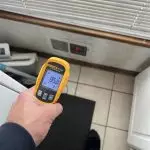Buying a home is an extremely exciting journey, as well as a complex process with many steps involved…
***One of the most crucial steps in my opinion as a Real Estate Professional is the home inspection. Guys, believe me- I have seen it all (between leaking new constructions & impeccably preserved 100 year old homes)***
In this ultimate home inspection guide, Roman & I will walk you through what to expect during the inspection process. With over 20 years experience in home improvements, renovations & inspections, Roman has been an incredible resource for my clients throughout the years.
A home inspection is an opportunity for buyers to gain a deeper understanding of the property they are considering purchasing. It helps to identify any hidden defects or potential safety hazards that may not be immediately apparent. With the insights gained from a proper home inspection, buyers can make informed decisions about the property, negotiate repairs or price adjustments, or even reconsider their purchase if significant issues are discovered.
To ensure a comprehensive and reliable home inspection, it is crucial to hire a qualified and experienced home inspector. A good home inspector should be objective, unbiased, and thorough in their evaluation especially in this intense sellers market.
What to Expect During the Inspection
On the day of the inspection, the home inspector will thoroughly examine the property, assessing its structural integrity, electrical systems, plumbing, HVAC systems, roofing, insulation, and more. The process usually takes a few hours, depending on the size of the property.
Areas Typically Inspected
While every home inspection is unique, there are several key areas that inspectors generally evaluate:
- Structural Components: Inspecting the foundation, walls, roof, and overall structural integrity of the property. (This may, depending on inspector, include a termite inspection)
- Electrical Systems: Assessing the electrical panel, wiring, outlets, switches, and ensuring compliance with safety standards.
- Plumbing Systems: Checking for leaks, adequate water pressure, functionality of fixtures, and drainage.
- HVAC Systems: Evaluating the heating, ventilation, and air conditioning systems for proper operation and maintenance.
- Exterior: Examining the condition of the siding, windows, doors, gutters, and any other exterior features.
- Environmental: Mold/Radon- Radon is a colorless, odorless, and tasteless gas that occurs naturally in the environment.
Now why is radon a concern?
Radon is a health concern because it is the second leading cause of lung cancer, after smoking. When radon gas is released from the ground and accumulates indoors, it can become trapped and reach high concentrations. Prolonged exposure to high levels of radon increases the risk of developing lung cancer, especially for those who smoke or have a history of smoking. The test itself is fairly simple- the inspector leaves a device, such as a charcoal canister, in the lowest livable area of the home for about 2-3 days. The inspector then picks up the canister and sends it out for testing in the Labs (this step takes about a week to get back).
If the radon results come back over the 4.0 limit, remediation must be done. This remediation is usually done by the sellers & once a system is installed you can turn it back on anytime afterwards if the levels go back up.
If anyone is EVER in need of a great Radon Remediation company, make sure to contact Jim Gibson with Radon Removal
Moving on from my radon testing rant (VERY IMPORTANT- GET IT DONE!!!!!)
Additional type of inspections
Depending on the home, you might need more than one inspection or inspector.
- A septic system is an underground wastewater treatment system commonly used in rural or suburban areas that are not connected to a municipal sewer line. It consists of a septic tank, where solid waste settles and separates from liquids, and a drainfield, where wastewater is filtered and dispersed into the ground. For obvious reasons, its extremely important to make sure there are no leaks & everything is up to code!
- A thorough pool inspection assesses the condition of the pool’s structure, equipment, electrical systems, and safety features like fences and covers.
- Well water testing is crucial for private well owners to ensure the safety and quality of their drinking water. Testing involves analyzing the water for microbiological and chemical contaminants.
Following your inspections, the inspector will send a detailed report & summary to the buyers and the buyers agent. With the help of your agent and inspector, you will be able to read through the report and start the negotiation process.
Certain issues may sound scary or expensive to fix, but they can actually be resolved with relatively inexpensive solutions.
- Faulty Electrical Outlets: If an inspector identifies electrical outlets that are not functioning or appear unsafe, it may sound alarming. However, in many cases, the issue could be as simple as a loose wire connection or a faulty outlet itself. Replacing an outlet or addressing minor wiring issues can be a relatively inexpensive fix.
- Leaky Faucets: While a leaking faucet may sound like a potential plumbing nightmare, it is often a minor problem that can be resolved with basic repairs. Often, all that is needed is a quick adjustment to the faucet components.
- Cracked Tile Grout: Cracked grout in bathroom or kitchen tiles can give the impression of significant water damage or costly repairs. However, regrouting is a relatively easy and cheap fix that can restore the appearance and integrity of the tiled surfaces.
- Minor Roof Repairs: If the home inspection reveals some damaged shingles or minor roof issues, it may initially raise concerns about the overall condition. In many cases, these problems can be addressed by replacing a few shingles or performing minor repairs, which are relatively inexpensive.
- Clogged Drains: Slow or clogged drains can be a nuisance, but they often don’t require extensive plumbing work. Simple solutions like using a plunger, drain snake, or drain cleaners can effectively clear most minor blockages without significant cost.
- Gutter Maintenance: Inspectors may notice clogged or improperly installed gutters, which can lead to water damage or drainage issues. Cleaning out gutters or adjusting their slope to ensure proper water flow is a simple fix that can prevent potential problems in the future.
It’s important to note that the severity of these issues may vary. However, in many instances, what may initially sound like a major problem during a home inspection can turn out to be a relatively inexpensive fix.
To make the most of your home inspection, it is essential to prepare beforehand.
Tips for buyers
- Understand Repair vs. Maintenance: Distinguish between necessary repairs and routine maintenance tasks.
- One of the biggest tips for my buyers is to attend the inspection. This is so you can ask questions and address any concerns on the spot. A lot of times Roman provides valuable insights to our clients, including locating shut off valves and tips on maintaining your future home.
- Keep Realistic Expectations: While a home inspection is crucial for uncovering issues, it’s important to understand that no property is perfect. Focus on the major concerns and consider the overall condition and potential of the home.
Tips for sellers
- Clear Accessibility: Ensure that all areas of the property, including attics, basements, crawl spaces, and utility rooms, are easily accessible for the inspector.
- Make Repairs in Advance: Fix minor issues that you are aware of, such as leaky faucets or loose doorknobs, as this can create a positive impression during the inspection & avoid nitpicking from the buyers. It’s also always a good idea to patch any holes in your walls.
- Organize and provide any documents related to previous repairs, renovations, or warranties that may be relevant to the inspection.







0 Comments